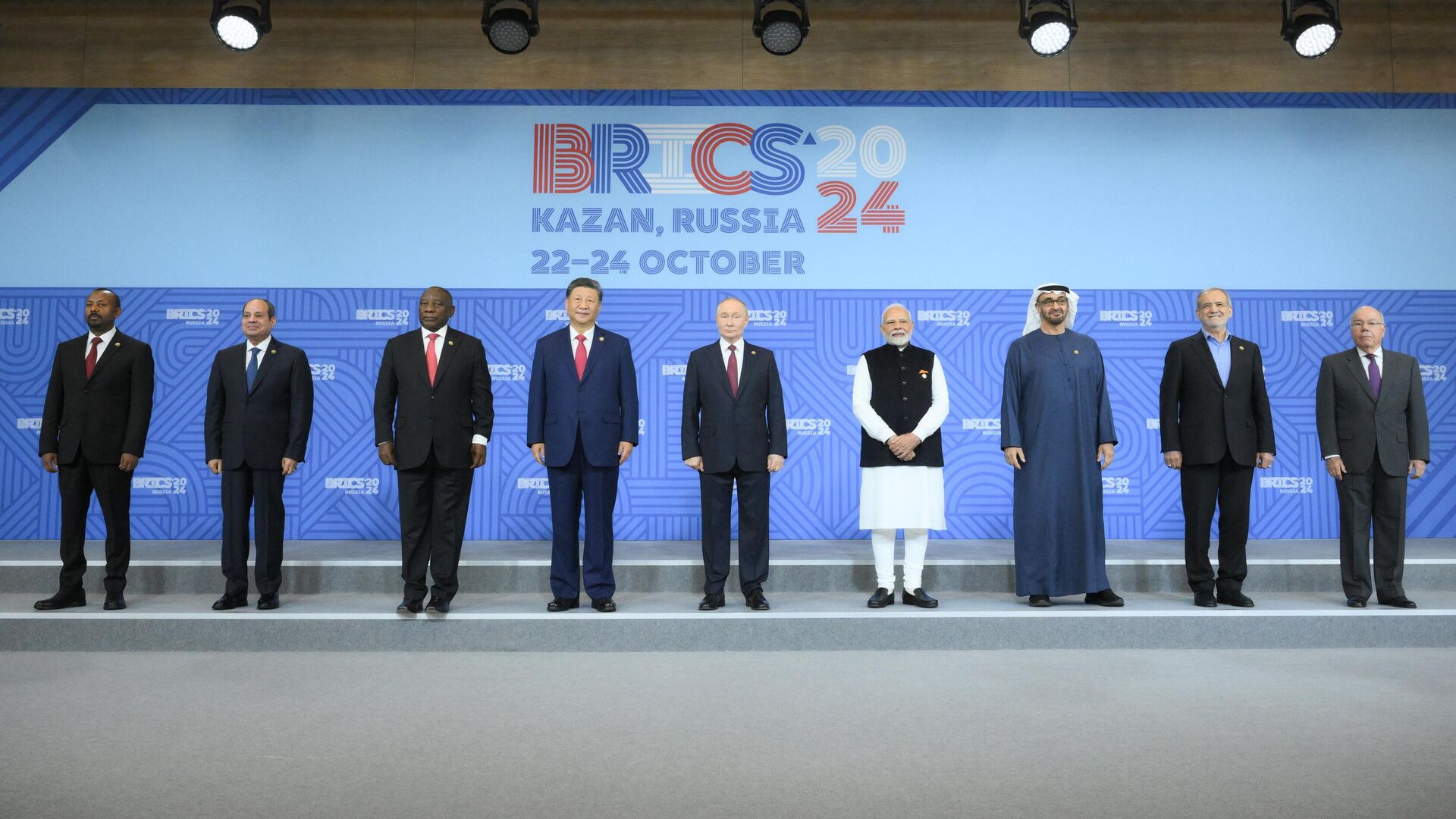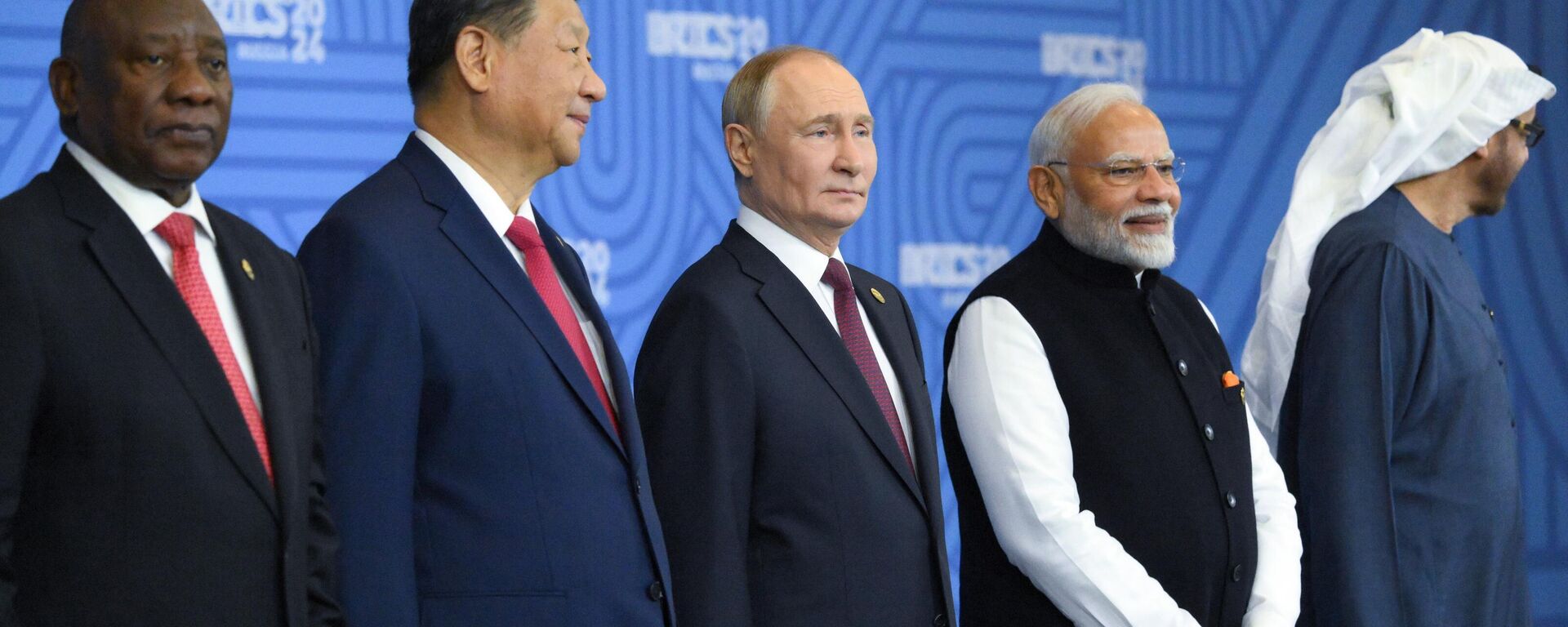https://sputniknews.in/20241025/us-allies-vilify-brics-for-defying-wests-hegemony-and-unipolarity-8326867.html
US, Allies Vilify BRICS for Defying West’s Hegemony and Unipolarity
US, Allies Vilify BRICS for Defying West’s Hegemony and Unipolarity
Sputnik India
The BRICS is a powerful geo-economic forum reshaping global power dynamics. The West demonise BRICS for challenging their influence hegemony, and their grip on... 25.10.2024, Sputnik India
2024-10-25T20:00+0530
2024-10-25T20:00+0530
2024-10-25T20:01+0530
sputnik opinion
brics
brics summit 2024
kazan brics summit
vladimir putin
india
china
russia
collective west
us
https://cdn1.img.sputniknews.in/img/07e8/0a/17/8312538_0:172:3327:2043_1920x0_80_0_0_d651780774fc9617c90465e45897fd16.jpg
The US and its Western allies fear losing its power, influence, and control over the rest of the world, driving it and its media to demonise BRICS, now spanning 10 countries across Eurasia, the Middle East, Africa, and Asia, Dr. Ajay Patnaik, a former Dean of the School of International Studies at the premier Jawaharlal Nehru University (JNU) in Delhi, told Sputnik India.The expert highlighted BRICS Summit's success in uniting diverse nations from various regions with distinct economic systems, growing trade (India has become the second-largest importer of crude from Russia after China), mentality, and even bilateral issues, driven by shared, pressing challenges that transcend their differences.Russia has mediated in easing friction between India and China by bringing them together on a shared platform, allowing the neighbouring leaders to meet and exchange views after five years of strained relations, Patnaik emphasised. He highlighted the significant breakthrough underway, marked by initial steps in border disengagement, starting with the removal of temporary structures.While the US and its allies push to maintain a unipolar world order, BRICS has consistently advocated for a multipolar approach, the expert further stated.Led by the US and its allies, the West has consistently restricted Global South representation in financial giants like the International Monetary Fund and the World Bank, while largely ignoring their calls for reform in United Nations, he noted.Many Global South countries, sharing a dislike for the West’s hegemonic stance and requiring development assistance, find that BRICS amplifies their voices and provides financial aid after years of being sidelined by Western institutions, Patnaik said.He also observed, that, unlike the West, BRICS nations show no selectivity in confronting challenges such as climate change and terrorism, stating that this forum is built on consensus in its discussion, resolutions, and declarations.Patnaik mentioned the Non-Aligned Movement (NAM), which, despite lacking military power, held a strong moral voice and authority that united numerous countries and "forcing global powers to hear them out."He believes that by coming together, the BRICS countries, especially India, China and Russia, with so much of the global GDP, population and land area, can contribute to the development of the rest of the nations in the Global South.BRICS has significantly shifted the global pecking order, which was previously dominated by the US and Europe, Patnaik underscored. Nations like India and China, as both military and economic powers within BRICS, have taken the West head on. Despite Western attempts, India and China are unwilling to abandon Russia, recognising its essential role in a redefined world order, the pundit stressed. India for that matter has never toed the Western line on the Ukraine conflict despite being put under all sorts of pressure by the Joe Biden administration.He suggested that BRICS, focused on the Global South and the developing world, need to remain open to an underdeveloped economies and nations favouring a multipolar world order. The grouping's growing diversity will be unified by shared values, aspirations, and interests, Patnaik concluded.
https://sputniknews.in/20241024/nations-look-up-to-brics-frustrated-by-western-financial-institutions-8318518.html
india
china
russia
us
washington d.c.
beijing
delhi
new delhi
moscow
ukraine
global south
Sputnik India
feedback.hindi@sputniknews.com
+74956456601
MIA „Rossiya Segodnya“
2024
Pawan Atri
https://cdn1.img.sputniknews.in/img/07e6/0c/13/139630_147:0:831:684_100x100_80_0_0_8fa2b25903e7787fe6a2698552c167df.png
Pawan Atri
https://cdn1.img.sputniknews.in/img/07e6/0c/13/139630_147:0:831:684_100x100_80_0_0_8fa2b25903e7787fe6a2698552c167df.png
News
en_IN
Sputnik India
feedback.hindi@sputniknews.com
+74956456601
MIA „Rossiya Segodnya“
Sputnik India
feedback.hindi@sputniknews.com
+74956456601
MIA „Rossiya Segodnya“
Pawan Atri
https://cdn1.img.sputniknews.in/img/07e6/0c/13/139630_147:0:831:684_100x100_80_0_0_8fa2b25903e7787fe6a2698552c167df.png
brics, brics summit 2024, kazan brics summit , vladimir putin, india, china, russia, collective west, us, washington d.c., beijing, delhi, new delhi, moscow, ukraine, special military operation, world bank, new development bank (ndb), joe biden, global south
brics, brics summit 2024, kazan brics summit , vladimir putin, india, china, russia, collective west, us, washington d.c., beijing, delhi, new delhi, moscow, ukraine, special military operation, world bank, new development bank (ndb), joe biden, global south
US, Allies Vilify BRICS for Defying West’s Hegemony and Unipolarity
20:00 25.10.2024 (Updated: 20:01 25.10.2024) The BRICS is a powerful geo-economic forum reshaping global power dynamics. The West demonise BRICS for challenging their influence hegemony, and their grip on the global world order, an expert said.
The US and its Western allies fear losing its power, influence, and control over the rest of the world, driving it and its media to demonise BRICS, now spanning 10 countries across Eurasia, the Middle East, Africa, and Asia, Dr. Ajay Patnaik, a former Dean of the School of International Studies at the premier Jawaharlal Nehru University (JNU) in Delhi, told Sputnik India.
"BRICS is not anti-West, it is a non-West organisation, but the US and its European friends don't want any non-Western bloc to come up that challenges their hegemony in the world, and it is the core reason behind their hatred of this grouping," Patnaik stated on Friday.
The expert highlighted BRICS Summit's success in uniting diverse nations from various regions with distinct economic systems, growing trade (India has become the second-largest importer of crude from Russia after China), mentality, and even bilateral issues, driven by shared, pressing challenges that transcend their differences.
Russia has mediated in easing friction between India and China by bringing them together on a shared platform, allowing the neighbouring leaders to meet and exchange views after five years of strained relations, Patnaik emphasised. He highlighted the significant breakthrough underway, marked by initial steps in border disengagement, starting with the
removal of temporary structures.
While the US and its allies push to maintain a unipolar world order, BRICS has consistently
advocated for a multipolar approach, the expert further stated.
"Primarily, it is unipolarity vs multipolarity and the latter is attracting many because these nations would find space within that system, where there would be different poles of global governance, something that is very much part of the BRICS," the specialist elaborated.
Led by the US and its allies, the West has consistently restricted Global South representation in financial giants like the International Monetary Fund and the World Bank, while largely ignoring their calls for reform in United Nations, he noted.
Many Global South countries, sharing a dislike for the West’s hegemonic stance and requiring development assistance, find that BRICS amplifies their voices and provides financial aid after years of being sidelined by Western institutions, Patnaik said.
He also observed, that, unlike the West, BRICS nations show no selectivity in confronting challenges such as climate change and terrorism, stating that this forum is built on consensus in its
discussion, resolutions, and declarations.
Patnaik mentioned the Non-Aligned Movement (NAM), which, despite lacking military power, held a strong moral voice and authority that united numerous countries and "forcing global powers to hear them out."
"To achieve something similar, engaging with the Global South countries is paramount and BRICS has been doing that with rigor and focus much better than the NAM. Hence, the Russian President is right in expressing his readiness to "build a better world" alongside with these nations," Patnaik asserted.
He believes that by coming together, the BRICS countries, especially India, China and Russia, with so much of the global GDP, population and land area, can contribute to the development of the rest of the nations in the Global South.
BRICS has significantly shifted the global pecking order, which was previously dominated by the US and Europe, Patnaik underscored. Nations like India and China, as both military and economic powers within BRICS, have taken the West head on.
Despite Western attempts, India and China are unwilling to abandon Russia, recognising its essential role in a redefined world order, the pundit stressed. India for that matter has never toed the Western line on the Ukraine conflict despite being put under
all sorts of pressure by the
Joe Biden administration.
"The troika of India, China, and Russia have come up with initiatives like the New Development Bank (NDB), which is an alternative institution to the IMF and the World Bank that put so many conditionalities on nations to disburse their loans to underdeveloped or developing sovereign states. But NDB doesn't insist on such conditionalities to offer economic aid to poor nations as easier term loans are given," Patnaik said.
He suggested that BRICS, focused on the Global South and the developing world, need to remain open to
an underdeveloped economies and nations favouring a multipolar world order. The grouping's growing diversity will be unified by shared values, aspirations, and interests, Patnaik concluded.



